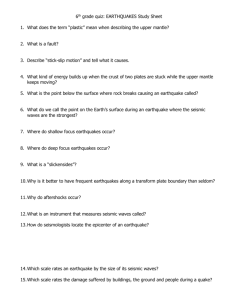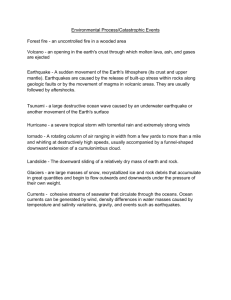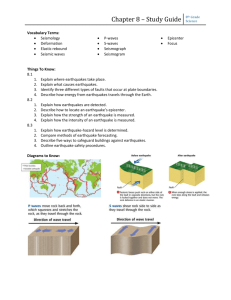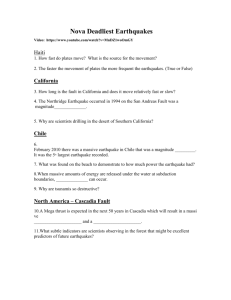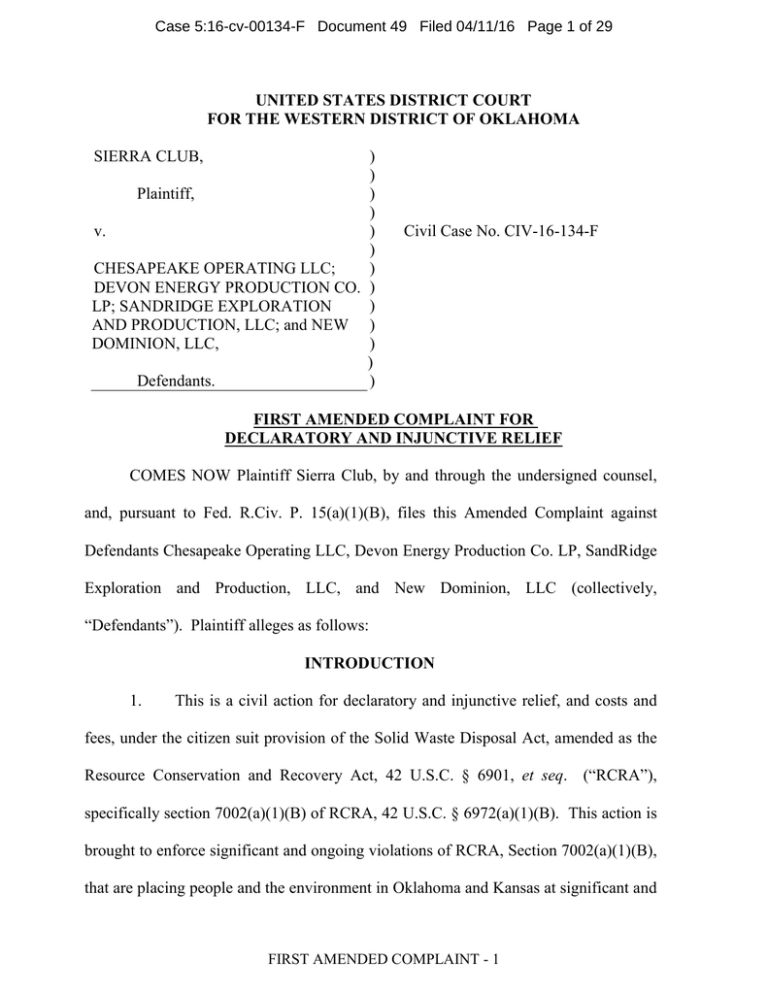
Case 5:16-cv-00134-F Document 49 Filed 04/11/16 Page 1 of 29
UNITED STATES DISTRICT COURT
FOR THE WESTERN DISTRICT OF OKLAHOMA
SIERRA CLUB,
)
)
Plaintiff,
)
)
)
v.
)
)
CHESAPEAKE OPERATING LLC;
DEVON ENERGY PRODUCTION CO. )
)
LP; SANDRIDGE EXPLORATION
AND PRODUCTION, LLC; and NEW )
DOMINION, LLC,
)
)
Defendants.
)
Civil Case No. CIV-16-134-F
FIRST AMENDED COMPLAINT FOR
DECLARATORY AND INJUNCTIVE RELIEF
COMES NOW Plaintiff Sierra Club, by and through the undersigned counsel,
and, pursuant to Fed. R.Civ. P. 15(a)(1)(B), files this Amended Complaint against
Defendants Chesapeake Operating LLC, Devon Energy Production Co. LP, SandRidge
Exploration and Production, LLC, and New Dominion, LLC (collectively,
“Defendants”). Plaintiff alleges as follows:
INTRODUCTION
1.
This is a civil action for declaratory and injunctive relief, and costs and
fees, under the citizen suit provision of the Solid Waste Disposal Act, amended as the
Resource Conservation and Recovery Act, 42 U.S.C. § 6901, et seq. (“RCRA”),
specifically section 7002(a)(1)(B) of RCRA, 42 U.S.C. § 6972(a)(1)(B). This action is
brought to enforce significant and ongoing violations of RCRA, Section 7002(a)(1)(B),
that are placing people and the environment in Oklahoma and Kansas at significant and
FIRST AMENDED COMPLAINT - 1
Case 5:16-cv-00134-F Document 49 Filed 04/11/16 Page 2 of 29
immediate risk from major man-made earthquakes induced by Defendants’ waste
disposal practices.
2.
As detailed below, Defendants generate, handle, transport, and dispose of
large volumes of liquid wastes from oil and gas extraction activities (“Production
Wastes”). They dispose of these wastes by injecting them into wells drilled deep into
the ground. Defendants have contributed and continue to contribute to the increased
seismicity triggered by the waste handling, transport, and disposal activities at the
injection wells owned or operated by the Defendants throughout the State of Oklahoma
and southern Kansas. The earthquakes induced by these waste management activities
may, and in fact, do, present an imminent and substantial endangerment to health and
the environment in violation of RCRA Section 7002(a)(1)(B), 42 U.S.C. §
6972(a)(1)(B).
3.
As shown on Figure 1 attached to this complaint, the number of
earthquakes in Oklahoma has increased more than 300 fold, from a maximum of 167
before 2009 to 5,838 in 2015. As the number of earthquakes has increased, so has their
severity. For example, the number of magnitude 3.5 earthquakes has increased fifty fold
from 4 in 2009 to 220 in 2015. See Figure 2. These waste-induced earthquakes have
toppled historic towers, caused parts of houses to fall and injure people, cracked
basements, and shattered nerves, as people fear there could be worse to come.
4.
A large number of earthquakes is an indication that more severe
earthquakes are likely. According to the Gutenberg-Richter Relation, a series of small
earthquakes suggests that a larger one may take place in the same area. As a result of
FIRST AMENDED COMPLAINT - 2
Case 5:16-cv-00134-F Document 49 Filed 04/11/16 Page 3 of 29
the large number of earthquakes in the area, seismologists have stated that a magnitude
7 quake is possible along the Nemaha fault. See Figure 6. Such a quake could cause
devastating harm. Further illustrating this risk, a 5.1 earthquake shook northwest
Oklahoma on February 13, 2016. E.g. http://www.cbsnews.com/news/5-1-magnitudeearthquake-among-several-to-shake-oklahoma/
5.
The United States Geological Survey (“USGS”) has recently produced a
report quantifying these risks. It found that the earthquake risks in Oklahoma have risen
rapidly as a result of deep disposal of Production Wastes by Defendants and others.
Oklahoma earthquake risks are now the highest in the nation on a par with California.
Maps included in the report show a broad swathe of the State of Oklahoma has 5-12%
likelihood of a highly damaging earthquake in the next year. Petersen, M.D., Mueller,
C.S., Moschetti, M.P., Hoover, S.M., Llenos, A.L., Ellsworth, W.L., Michael, A.J.,
Rubinstein, J.L., McGarr, A.F., and Rukstales, K.S., 2016, 2016 One-year seismic hazard
forecast for the Central and Eastern United States from induced and natural earthquakes:
U.S.
Geological
Survey
Open-File
Report
2016–1035,
52
p.,
http://dx.doi.org/10.3133/ofr20161035.
6.
To reduce this substantial risk of harm from waste-induced earthquakes,
Plaintiff seeks an Order requiring Defendants to reduce immediately and substantially
the amounts of Production Wastes they are injecting into the ground to levels that
seismologists believe will not cause or contribute to increased earthquake frequency and
severity. At a minimum, the current rates of injection, particularly into the Arbuckle
Formation, a layer of rock just above the basement rock in which the earthquakes
FIRST AMENDED COMPLAINT - 3
Case 5:16-cv-00134-F Document 49 Filed 04/11/16 Page 4 of 29
originate, must be substantially reduced in order to abate the currently unacceptable
earthquake risks.
7.
Even if all the injection wells in Oklahoma ceased operating immediately,
it would take a long period of time for the earthquake risk to return to natural background.
Daniel McNamara, a seismologist at the USGS Geologic Hazards Science Center, has
estimated that the injection that has already occurred could generate earthquakes for
hundreds of years. e.g. Scientific American, Drilling for Earthquakes, March 28, 2016
available at http://www.scientificamerican.com/article/drilling-for-earthquakes/.
8.
Because a reduction in injection volumes would take substantial time to
result in a reduction in earthquakes, Plaintiff also seeks an Order requiring Defendants
to reinforce vulnerable structures that current forecasts indicate could be impacted by
large magnitude earthquakes during the interim period.
9.
Because no government body is currently taking a holistic or proactive
view of waste injection and its potential to induce earthquakes, Plaintiff further seeks an
Order requiring the establishment of an independent earthquake monitoring and
prediction center to determine the amount of Production Wastes which may be injected
into a specific well or formation before induced seismicity occurs. Additionally, the
center would be responsible for tracking the degree to which the ongoing earthquakes
conform to researchers’ predictions, which could necessitate further investigation and
characterization of the underlying rock formations, including the Arbuckle, if predictions
are not sufficiently accurate.
FIRST AMENDED COMPLAINT - 4
Case 5:16-cv-00134-F Document 49 Filed 04/11/16 Page 5 of 29
10.
Finally, Plaintiff requests that the Court award Plaintiff reasonable
attorneys’ fees, expert witness fees, and costs incurred in bringing this action, and any
further relief it deems appropriate.
JURISDICTION
11.
This Court has jurisdiction over the claims set forth in this complaint under
Section 7002(a) of RCRA, 42 U.S.C. § 6972(a), under 28 U.S.C. § 1331, the federal
question statute, and the Declaratory Judgment Act, 28 U.S.C. § 2201 et seq.
12.
This Court has jurisdiction over each of the Defendants in that each of them
have purposely availed themselves of Oklahoma laws by, among other things, seeking
permits for injection wells and drilling and operating such wells within the district of this
court. Defendants Chesapeake Operating, LLC, SandRidge Exploration and Production,
LLC, and Devon Energy Production Co., LP have corporate headquarters and principal
places of business located in Oklahoma City. Defendant New Dominion, LLC has
significant drilling and operating activities and maintains offices and employees in this
district. All of the Defendants operate wastewater injection wells within the district of
this Court which have caused and contributed to, and continue to cause and contribute
to, the harms suffered by Plaintiff.
13.
Section 7002(a)(1)(B) of RCRA, 42 U.S.C. § 6972(a)(1)(B), allows
citizens to bring suit in order to stop an “imminent and substantial endangerment to
health or the environment.” It provides that any person may commence an action against
“any person [. . .] including any past or present generator, past or present transporter, or
past or present owner or operator of a treatment, storage, or disposal facility, who has
FIRST AMENDED COMPLAINT - 5
Case 5:16-cv-00134-F Document 49 Filed 04/11/16 Page 6 of 29
contributed or is contributing to the past or present handling, storage, treatment,
transportation, or disposal of any solid or hazardous waste which may present an
imminent and substantial endangerment to health or the environment[.]”
14.
On October 29, 2015, Plaintiff gave notice of the violations and its intent
to file suit to the Defendants, the Defendants’ registered agents, United States Attorney
General, United States Environmental Protection Agency (“EPA”), EPA Region VI,
Oklahoma Department of Environmental Quality, and the Oklahoma Corporation
Commission, as required by Section 7002(a) of RCRA, 42 U.S.C. § 6972(a). The
registered mail receipts show the notice letter was received by Defendants (other than
SandRidge Exploration and Production, LLC) and other entities to whom the letter was
sent on or before November 5, 2015. Plaintiff’s notice letter is attached as Exhibit 1 and
is incorporated by reference herein.
15.
With regard to SandRidge Exploration and Production, LLC, the registered
mail receipts show that it received the notice letter on January 7, 2016.
16.
More than ninety (90) days have passed since Plaintiff provided its notice
of intent to file suit to all Defendants and other recipients.
17.
The endangerment complained of in the notice is continuing at this time or
is reasonably likely to continue, because Defendants have failed to take corrective actions
sufficient to abate the endangerment conditions.
18.
Neither the EPA nor the State of Oklahoma have commenced or are
diligently prosecuting a civil or criminal action in a state or federal court to abate the
imminent and substantial endangerment to health and the environment alleged in
FIRST AMENDED COMPLAINT - 6
Case 5:16-cv-00134-F Document 49 Filed 04/11/16 Page 7 of 29
Plaintiff’s notice of intent letter.
Nor is the EPA, under the Comprehensive
Environmental Response, Compensation and Liability Act, engaged in any of the actions
described in 42 U.S.C. 6972(b)(2)(B) with respect to the conditions described herein.
VENUE
19.
Venue is properly vested in this Court under Section 7002(a) of RCRA, 42
U.S.C. § 6972(a), because the Defendants own or operate within this district injection
wells and related facilities for the handling, storage, treatment, transportation, or disposal
of waste fluids from oil extraction and hydraulic fracturing (“fracking”) activities
industries and the alleged endangerment occurred and continues to occur within this
district.
PLAINTIFF
20.
Plaintiff Sierra Club is a California non-profit organization and has its
principal place of business at 85 Second Street, 2nd Floor, San Francisco, California
94105.
21.
The Sierra Club has a chapter within the State of Oklahoma, the Oklahoma
Sierra Club, with its principal place of business at 600 NW 23rd Street, Suite 204,
Oklahoma City, Oklahoma 73103.
22.
In addition, the Sierra Club has a chapter within the State of Kansas, the
Kansas Chapter of the Sierra Club, with its principal place of business at 9844 Georgia
Avenue, Kansas City, Kansas 66109, which includes the Southwind Group, covering
southern Kansas, based in Wichita, Kansas.
FIRST AMENDED COMPLAINT - 7
Case 5:16-cv-00134-F Document 49 Filed 04/11/16 Page 8 of 29
23.
The Sierra Club is America’s oldest and largest grassroots environmental
organization. Sierra Club has more than 2 million members and supporters, with over
3,000 members within the State of Oklahoma and over 4,000 members within the State
of Kansas. Founded in 1892, the Sierra Club has been working for well over a century
to protect communities, wild places, and the planet itself. The Sierra Club is dedicated
to exploring, enjoying, and protecting the wild places of the Earth; to practicing and
promoting the responsible use of the Earth's resources and ecosystems; to educating and
enlisting humanity to protect and restore the quality of the natural and human
environment; and to using all lawful means to carry out these objectives. The Sierra
Club's concerns encompass the exploration, enjoyment, and protection of the lands and
waters of Oklahoma.
24.
At least 10 of Sierra Club’s members that are affected by the endangerment
are prepared to be standing witnesses.
These members have already experienced
concrete harms from the earthquakes, such as cracking of the walls of their homes. In
addition, the waste induced earthquakes detract from their enjoyment of their homes and
the surrounding environment. Furthermore, they have a reasonable fear that if effective
action is not taken to stem the earthquake swarm, their homes and their environment
could suffer far more damage that could be catastrophic.
25.
Plaintiff was and is a “person” within the meaning of Section 1004(15) of
RCRA, 42 U.S.C. § 6903(15). Plaintiff has standing because its members are being
harmed by Defendants’ waste management activities, the relief requested would redress
FIRST AMENDED COMPLAINT - 8
Case 5:16-cv-00134-F Document 49 Filed 04/11/16 Page 9 of 29
these harms, and the interests Plaintiff seeks to protect are germane to the organization’s
purpose.
26.
Neither the claims asserted in this Complaint, nor the relief requested,
require the participation of the individual members of the organizations in this lawsuit.
DEFENDANTS
27.
Defendant Chesapeake Operating, LLC (“Chesapeake”) is a corporation
existing and operating under the laws of the State of Oklahoma that does business within
the State of Oklahoma and has its principal place of business at 6100 N. Western Avenue,
Oklahoma City, Oklahoma 73118-1044.
28.
Defendant New Dominion, LLC (“New Dominion”) is a corporation
existing and operating under the laws of the State of Oklahoma that has substantial
activity within the State, including drilling and operating wells and maintaining offices
and employees.
29.
Defendant Devon Energy Production Co., LP (“Devon”) is a corporation
existing and operating under the laws of the State of Oklahoma that does business in the
State of Oklahoma and has its principal place of business at 20 North Broadway, Suite
1500, Oklahoma City, Oklahoma 73102-8202.
30.
Defendant SandRidge Exploration and Production, LLC (“SandRidge”) is
a corporation existing and operating under the laws of the State of Oklahoma that does
business in the State of Oklahoma and has its corporate headquarters at 123 Robert S.
Kerr Avenue Oklahoma City, OK 73102-6406.
FIRST AMENDED COMPLAINT - 9
Case 5:16-cv-00134-F Document 49 Filed 04/11/16 Page 10 of 29
31.
Defendants were and are “persons” within the meaning of Section
1004(15) of RCRA, 42 U.S.C. § 6903(15).
32.
All of the Defendants are oil and gas companies that transport, handle, and
dispose of waste fluids from oil and gas production activities by taking them from the
point of production to waste injection wells, where the wastes are disposed by injecting
them deep into the ground.
33.
All of the Defendants have purposely availed themselves of Oklahoma
laws by, among other things, seeking permits for injection wells and drilling and
operating such wells within the district of this Court. Defendants Chesapeake Operating,
LLC, SandRidge Exploration and Production, LLC, and Devon Energy Production Co.,
LP have corporate headquarters and principal places of business located in Oklahoma
City. Defendant New Dominion, LLC has significant drilling and wastewater injection
activities and maintains offices and employees in this district. All of the Defendants
operate wastewater injection wells within the district of this Court which have caused
and contributed to, and continue to cause and contribute to, the harms suffered by
Plaintiff.
FACTS
I.
34.
Earthquakes Induced By Defendants’ Waste Injection are Causing
Endangerment in Central and North-Central Oklahoma and
Southern Kansas
In recent years, it has been established that the injection of Production
Wastes into the ground through high rate disposal wells causes earthquakes. After much
local controversy, the Oklahoma Geological Survey (“OGS”) determined in the spring
FIRST AMENDED COMPLAINT - 10
Case 5:16-cv-00134-F Document 49 Filed 04/11/16 Page 11 of 29
of 2015 that “the majority of recent earthquakes in central and north-central Oklahoma
are very likely triggered by the injection of produced water in disposal wells” and that
“seismologists have documented the relationship between wastewater disposal and
triggered seismic activity.”
http://earthquakes.ok.gov/what-we-know/ (visited on
October 9, 2015).
35.
The United States Geological Survey (“USGS”) fully supports this
conclusion. For example a New Yorker article recently quoted USGS geologist William
Ellsworth in reporting that “[d]isposal wells trigger earthquakes when they are dug too
deep, near or into basement rock, or when the wells impinge on a fault line. Ellsworth
said,
‘Scientifically,
it’s
really
quite
clear.’”
http://www.newyorker.com/magazine/2015/04/13/weather-underground.
36.
The United States Geological Survey (“USGS”) has recently produced a
report quantifying these risks. It found that the earthquake risks in Oklahoma have risen
rapidly as a result of deep disposal of Production Wastes by Defendants and others.
Oklahoma earthquake risks are now the highest in the nation on a par with California.
Maps included in the report show a broad swathe of the State of Oklahoma has 5-12%
likelihood of a highly damaging earthquake in the next year. Petersen, M.D., Mueller,
C.S., Moschetti, M.P., Hoover, S.M., Llenos, A.L., Ellsworth, W.L., Michael, A.J.,
Rubinstein, J.L., McGarr, A.F., and Rukstales, K.S., 2016, 2016 One-year seismic hazard
forecast for the Central and Eastern United States from induced and natural earthquakes:
U.S.
Geological
Survey
Open-File
Report
2016–1035,
http://dx.doi.org/10.3133/ofr20161035.
FIRST AMENDED COMPLAINT - 11
52
p.,
Case 5:16-cv-00134-F Document 49 Filed 04/11/16 Page 12 of 29
37.
Even if all the injection wells in Oklahoma ceased operating immediately,
it would take a long period of time for the earthquake risk to return to natural background.
Daniel McNamara, a seismologist at the USGS Geologic Hazards Science Center, has
estimated that the injection that has already occurred could generate earthquakes for
hundreds of years. e.g. Scientific American, Drilling for Earthquakes, March 28, 2016
available at http://www.scientificamerican.com/article/drilling-for-earthquakes/.
38.
Similar conclusions were reached by the authors of one of the first peer-
reviewed papers on this issue, published in July 2014, titled “Sharp increase in central
Oklahoma seismicity since 2008 induced by massive wastewater injection.” Keranan et
al., Sharp increase in central Oklahoma seismicity since 2008 induced by massive
wastewater injection, 448-451, 451 (July 3, 2014).
39.
The phenomenon that adding fluids into the earth can cause earthquakes is
not newly discovered. Well-known examples of water injection into wells causing
earthquakes have occurred in Colorado, Texas, India, and China. Most recently, in a
year-end review, EPA noted that many experts have concluded that a connection likely
exists between disposal well location, injection volume and rates, and seismic activity.
EPA was concerned with the continued upward trend in earthquakes and recommended
a reduction in the volumes of waste injected into the Arbuckle formation, which is the
most critical stratum in regards to induced seismicity. EPA further recommended
additional assessment and mapping of the Arbuckle formation and its connection to
basement rock.
FIRST AMENDED COMPLAINT - 12
Case 5:16-cv-00134-F Document 49 Filed 04/11/16 Page 13 of 29
40.
Based on publicly available data, the conclusion that wastewater injection
and the recent spate of earthquakes in Oklahoma and southern Kansas are related is
inescapable. Before 2009, the maximum number of earthquakes measured in a given
year in Oklahoma was 195 in 1995. By 2014, the number of measured earthquakes
soared to over 5,000, and in 2015 the number of earthquakes reached over 5,800. The
number of earthquakes that residents can feel has shown an even greater rate of increase.
In 2014, Oklahoma had 585 earthquakes of magnitude-3 or greater compared to 109
magnitude-3 quakes in 2013.
Since late 2009, the rate of magnitude-3 or larger
earthquakes in north-central Oklahoma has been nearly 300 times higher than in previous
decades. Of course, earthquakes do not respect state boundaries. The earthquake swarm
in central and northern Oklahoma also extends into southern Kansas. McNamara et al,
Earthquake hypocenters and focal mechanisms in central Oklahoma reveal a complex
system of reactivated subsurface strikeslip faulting, Geophysical Research Letters,
http://dx.doi. org/10.1002/2014GL062730 (Jan 27, 2015) (“Future Hazards”) at Figure
2.
41.
As discussed in a recent study, “this seismicity appears to be associated
with increases in saltwater disposal that originates as ‘flow-back’ water after multistage
hydraulic fracturing operations.” F. Rall Walsh III and Mark D. Zoback, Oklahoma’s
recent earthquakes and saltwater disposal, Science Advances, 18 Jun 2015 available at
http://advances.sciencemag.org/content/1/5/e1500195.full (“Disposal Study”).
42.
Since 2009, Defendants have injected huge amounts of Production Wastes
via disposal wells. The total cumulative volume of Production Wastes injected in
FIRST AMENDED COMPLAINT - 13
Case 5:16-cv-00134-F Document 49 Filed 04/11/16 Page 14 of 29
Oklahoma has increased from 2 billion (“bn”) barrels in 2009 to over 12 bn barrels in
2014. Figure 3. Focusing on the Arbuckle formation alone, which is the geologic
stratum in which large volume disposal wells discharge and which lies directly above
the basement rock where most of the earthquakes originate, Defendants account for over
60% of the total volume of Production Wastes injected in 2014. Figure 4. In specific
regions, individual Defendants have much larger shares of the local amount of injection.
New Dominion has been injecting large volumes since 2011, but since then, Devon has
almost matched New Dominion’s volumes, while Chesapeake has surpassed them.
Figure 5. SandRidge was a small player in 2012 and 2013, but became the largest
injector of Production Wastes in 2014 and 2015.
43.
Overlaying the locations of Defendants' wells onto the places where
earthquakes above magnitude 3.5 have occurred shows that earthquakes are occurring in
the vicinity of Defendants’ wells and along faults that are close to the wells. Figure 6.
As the frequency and volume of wastewater injection has increased in the central and
northern areas of Oklahoma, earthquake occurrences in those regions have
correspondingly increased. Compare Figure 7 with Figure 6.
44.
While not all wells cause earthquakes, studies have found that most high
volume disposal wells are linked to earthquakes: “Even though quake-associated wells
were only 10 percent of those studied, more than 60 percent of the high-rate wells — 12
million gallons or more — were linked to nearby earthquakes” and “of the 45 wells that
pump the most saltwater [waste] at the fastest rate, 34 of them — more than three out of
four — were linked to nearby quakes.”
FIRST AMENDED COMPLAINT - 14
Case 5:16-cv-00134-F Document 49 Filed 04/11/16 Page 15 of 29
http://www.nytimes.com/aponline/2015/06/18/science/ap-us-sci-manmadequakes.html?smprod=nytcore-ipad&smid=nytcore-ipad-share&_r=0.
45.
For example, just four wells owned by New Dominion have caused 20%
of all the seismic activity in the central U.S. from 2008 to 2013. Keranan et al., Sharp
increase in central Oklahoma seismicity since 2008 induced by massive wastewater
injection, Science Vol. 345, 448-451, 448 (July 3, 2014) (“Sharp Increase”). In addition,
Wells have been shown to induce earthquakes over 20 miles away.
46.
The Disposal Study confirms that “the significant increases in SWD [Salt
Water or Production Waste disposal] increase pore pressure in the Arbuckle Group,
which spreads out away from the injection wells with time, eventually triggering slip on
critically stressed faults in the basement.” It also confirms that “[i]njection of large
volumes of saltwater into the Arbuckle group appears to be triggering the release of
already stored strain energy in crystalline basement.” Disposal Study.
47.
It has therefore been scientifically established that injection of Production
Wastes induces earthquakes. Moreover, as previously stated, Defendants are injecting
much of the Production Wastes that are causing the earthquakes about which Plaintiff
complains.
48.
Importantly, as mentioned above, the risk is not only that there are more
frequent earthquakes, it is also that those earthquakes have been and will continue to
increase in severity. USGS scientists are warning that the smaller earthquakes induced
by the injection of Production Wastes are reawakening long-dormant, 300-million-yearold fault lines across Oklahoma. The faults could trigger much higher-magnitude, and
FIRST AMENDED COMPLAINT - 15
Case 5:16-cv-00134-F Document 49 Filed 04/11/16 Page 16 of 29
consequently more destructive, earthquakes than the smaller ones that have plagued the
state in recent years. According to USGS scientists, these reawakened faults in central
Oklahoma could produce earthquakes as powerful as magnitude-5 and 6. One USGS
geologist stated, “Many faults are reactivating, with as many as 17 magnitude-4
earthquakes in 2014.”
http://www.usatoday.com/story/news/nation/2015/03/10/oklahoma-earthquakes-faultlines/24702741/. In 2011, one even reached magnitude-5.4 in strength near Prague,
Oklahoma and just three days ago a 5.1 earthquake occurred in northwest Oklahoma.
49.
Last fall, two earthquakes of greater-than-magnitude-4 occurred in
Oklahoma on the same day-, which is further evidence of the increased frequency of
more serious earthquakes in the areas of concern. A magnitude 4.4 quake hit northern
Oklahoma on October 10, 2015, which one USGS researcher said “had all the hallmarks
of an induced quake” and “seem[ed] to be part of an ongoing swarm of induced quakes
in the area.” Guardian, October 10, 2015, Oklahoma Earthquake likely caused by
wastewater injection, seismologist says, available at http://www.theguardian.com/usnews/2015/oct/10/oklahoma-earthquake-fracking-us-geological-survey.
50.
On the same day, a magnitude 4.5 earthquake hit about 100 miles
southeast, near the major oil storage area of Cushing, Oklahoma. Cushing is the location
of the world's largest and most important crude oil storage hub. The emergency manager
reported that “the whole house shook.” The oil tanks did not suffer significant damage,
but it “shattered nerves.” New York Times, October 14, 2015 New Concern Over Quakes
in Oklahoma Near a Hub of U.S. Oil, available at
FIRST AMENDED COMPLAINT - 16
Case 5:16-cv-00134-F Document 49 Filed 04/11/16 Page 17 of 29
http://www.nytimes.com/2015/10/15/us/new-concern-over-quakes-in-oklahoma-neara-hub-of-us-oil.html. Scientists reported in a paper published online in September that
a large earthquake near the storage hub “could seriously damage storage tanks and
pipelines.” Dr. McNamara, the lead author of that study, stated that the recent earthquake
continued a worrisome pattern of moderate quakes, suggesting that a large earthquake is
more than a passing concern. “When we see these fault systems producing multiple
magnitude 4s, we start to get concerned that it could knock into higher magnitudes,” he
said. “Given the number of magnitude 4s here, it’s a high concern.” Id.
51.
The Cushing oil hub stores oil piped from across North America until it is
dispatched to refineries. As of last week, it held 53 million barrels of crude oil. The
earth beneath the tanks was comparatively stable until last October, when magnitude 4
and 4.3 earthquakes struck nearby in quick succession, revealing long-dormant faults
beneath the complex. Three more earthquakes with magnitudes 4 and over occurred
within a few miles of the tanks within a month. The Department of Homeland Security
has gauged potential earthquake dangers to the hub and concluded that a quake
equivalent to the record magnitude 5.7 could significantly damage the tanks.
Dr.
McNamara’s study concludes that recent earthquakes have increased stresses along two
stretches of fault that could lead to earthquakes of that size. Despite these risks, some
oil companies have challenged the right of the State of Oklahoma to reduce injection
volumes.
52.
Further south, the Nemaha fault runs north-northwest between Oklahoma
City and southern Kansas. Figure 6 attached. In a peer-reviewed paper in Science
FIRST AMENDED COMPLAINT - 17
Case 5:16-cv-00134-F Document 49 Filed 04/11/16 Page 18 of 29
magazine published in July 2014, seismologists found that a magnitude 7 earthquake is
possible along that fault. Furthermore, they stated that “the increasing proximity of the
earthquake swarm to the Nemaha fault presents a potential hazard to the Oklahoma City
metropolitan area.” Keranan et al., Sharp increase in central Oklahoma seismicity since
2008 induced by massive wastewater injection, Science Vol. 345, 448-451, 451 (July 3,
2014) (“Sharp Increase”). USGS scientists have also said that a magnitude 7 quake
cannot be ruled out.
53.
The Future Hazards study confirms that more severe earthquakes are likely
as a result of ongoing injection of Production Wastes into the ground through high-rate
disposal wells. It states that earthquake clusters associated with long fault structures
could give rise to magnitude 5 to 6 earthquakes.
Examples include earthquakes
associated with the Nemaha fault near Jones, in the Medford and Stillwater regions, and
between Langston and Guthrie. Another example is the area around Cushing. Future
Hazards at Figure 2. The paper concludes that the increased seismicity poses an elevated
hazard to infrastructure and the regional population.
54.
According to a recent paper referenced below, the Cushing area
earthquakes are associated with reactivated faults that cut into the Arbuckle formation
and a subsidiary fault called the Wilzetta-Whitehall. That paper noted that most of the
earthquakes do not lie along known fault structures but there may be other fault structures
that are being reawakened by the injections that are associated with these earthquakes.
The paper notes that earthquake activity in this area has been above forecast and that
“[i]nclusion of all recent Oklahoma earthquakes in the NSHM [hazard model]
FIRST AMENDED COMPLAINT - 18
Case 5:16-cv-00134-F Document 49 Filed 04/11/16 Page 19 of 29
significantly increases ground shaking estimates and earthquake hazard . . ., which would
result in serious implications for infrastructure design standards.” McNamara et al.,
Reactivated faulting near Cushing, Oklahoma: Increased potential for a triggered
earthquake in an area of United States strategic infrastructure, Geophysical Research
Letters (October 23. 2015) available at
http://onlinelibrary.wiley.com/doi/10.1002/2015GL064669/pdf.
55.
These earthquakes have already caused considerable physical damage and
mental disquiet. The scale to classify earthquakes is logarithmic, meaning that a
magnitude 4 earthquake is 10 times more powerful than a magnitude 3, and a magnitude
5 earthquake is 100 times more powerful than a magnitude 3. Earthquakes of magnitude
6 to 7 cause widespread damage and considerable loss of life. A series of shocks over
magnitude 5 in 2011, the largest of which was magnitude 5.6 in the Prague area of
Oklahoma, destroyed at least 16 houses and collapsed an historic spire at Benedictine
Hall at St. Gregory’s University. Repairing the spire cost about $5 million dollars. In
addition to the property damage, in nearby Prague the quakes have not only caused
property damage but have also caused harm to people. For example, Sandra Ladra was
at home watching television in her home in Prague, Oklahoma in November of 2011
when an earthquake caused the rock facing on her fireplace to fall. The rocks struck Ms.
Ladra causing her significant injury.
56.
If earthquakes of over 6 in magnitude struck Oklahoma or Kansas, there is
a very real danger that large numbers of people could be harmed or even killed. In
addition, storage tanks for oil and other products could be ruptured, pipes carrying oil,
FIRST AMENDED COMPLAINT - 19
Case 5:16-cv-00134-F Document 49 Filed 04/11/16 Page 20 of 29
gas, or other chemicals could be ruptured, and other damage to infrastructure could
occur. This would cause widespread environmental damage, in addition to property
damage and personal injuries. In particular, if a large earthquake struck the massive oil
storage area in Cushing, huge amounts of oil could be released, causing massive
environmental damage.
57.
The earthquakes are continuing in 2016. Oklahoma City residents were
awakened on January 1, 2016 with a 4.1 magnitude earthquake. Six days later, 4.3 and
4.8 magnitude earthquakes occurred back-to-back. Oklahoma has had 131 earthquakes
from January 1 through 16, 2016 ranging from 2.01 to 4.8.
58.
On February 13, 2016 at 11:07 a.m. a 5.1 magnitude earthquake struck 17
miles northwest of Fairview, Oklahoma. It was quickly followed by aftershocks of
magnitude 3.9, 3.7, 3.6, 3.5, 3.1 and 3.0. According to the Oklahoma Geological Survey,
this was the third largest earthquake recorded in Oklahoma history and was felt from
Kansas City, Missouri to Dallas, Texas. Of particular concern is the fact that the
epicenter was approximately 75 miles west of Cushing and its vulnerable oil storage
tanks and pipelines.
59.
Thus, the injection of large volumes of Production Wastes into the ground
in Oklahoma has caused and is causing large numbers of moderate strength earthquakes
in Oklahoma and southern Kansas. The constant increase in the number of these size
earthquakes, standing alone, causes an imminent and substantial endangerment to health
and the environment. That endangerment is exacerbated by the increasing likelihood of
FIRST AMENDED COMPLAINT - 20
Case 5:16-cv-00134-F Document 49 Filed 04/11/16 Page 21 of 29
a devastating earthquake that could injure or kill large numbers of people and cause
massive environmental devastation.
60.
Plaintiff and its members seek relief from this Court, as set forth in this
Complaint, to protect themselves and their environment by requiring the Defendants to
reduce substantially the volumes of Production Wastes that they are injecting and take
the other measures outlined in this Complaint to abate the present endangerment.
II.
61.
Defendants Have Violated and Are Violating RCRA by Causing
Earthquakes and/or Contributing to Their Cause
Having provided the required notice, Plaintiff is now entitled to bring suit
against “any person . . . who has contributed or who is contributing to the past or present
handling, storage, treatment, transportation, or disposal of any solid or hazardous waste
which may present an imminent and substantial endangerment to health or the
environment.” A potential endangerment exists when there is some reasonable cause for
concern that someone or something may be exposed to a risk of harm.
62.
As discussed above, and shown in even more detail below, Defendants
have contributed and are contributing to past and present handling, storage, transport,
and disposal of Production Wastes which is causing earthquakes that may present an
imminent and substantial endangerment to health or the environment. They are therefore
jointly and severally liable for the abatement of this endangerment.
FIRST AMENDED COMPLAINT - 21
Case 5:16-cv-00134-F Document 49 Filed 04/11/16 Page 22 of 29
III.
New Dominion Has Disposed of Production Wastes that Caused
Earthquakes and/or Contributed To Their Occurrence and is
Continuing to Do So
63.
The Sharp Increase study describes the mechanism for how high volume
waste disposal wells cause earthquakes. The rate of wastewater injection increased
rapidly from 2004 onwards, doubling between 2004 and 2008. The need for Production
Waste disposal increased as non-conventional “dewatering” oil production increased.
Dewatering production wells produce as much as 200 times the Production Wastes as
conventional oil wells. This led to a rapid increase in disposal via injection. At the same
time, the rate of earthquakes went up, establishing a direct correlation between injection
and earthquake frequency. The Sharp Increase study went beyond that and showed that
the high rate of injection was causing the swarm of earthquakes around Jones, which lies
close to Oklahoma City to the northeast.
64.
New Dominion started operating the first high rate injection well just south
of Oklahoma City in 2004. This well and the other three in the same area that followed
built up to an injection rate of 3 million barrels per month. This high rate of injection
caused pressure to build up in the ground. Sharp Impact at Figure 3. The Jones
earthquake swarm started concurrently with the reporting of positive pressure at the
wells. The scientists who wrote Sharp Increase showed that the wells were contributing
to an expanding zone of high pressure moving northeast. Id. at Figure 4. As the highpressure zone moved northeast so did the earthquakes. The four high -volume New
Dominion wells were responsible for 85% of the increase in pressure in this area.
Analysis of the ground conditions showed that higher pressures than were present in
FIRST AMENDED COMPLAINT - 22
Case 5:16-cv-00134-F Document 49 Filed 04/11/16 Page 23 of 29
2014 would be needed to cause an earthquake directly along the Nemaha fault. However,
the Sharp Increase scientists warned that if pressure built up further it could cause an
earthquake of magnitude 7.
65.
The Figures attached to this Complaint as Exhibit 2, based on publicly
available information and showing the spatial and temporal correlation, confirm the
Sharp Increase findings. From 2011 to 2014 New Dominion has been injecting large
volumes of Production Wastes. Figure 5. In 2011, New Dominion disposed of higher
volumes of waste than the other Defendants combined. Id. New Dominion’s disposal
mainly occurred through four wells close to Oklahoma City on the Nemaha fault and a
number near the Wilzetta fault to the east. Figure 6. In 2014, and probably other years,
the bulk of this injection was into the Arbuckle Formation. Figure 8. Between 2009 and
2011, 53 of the 54 greater than 3.5 magnitude earthquakes in Oklahoma occurred close
to New Dominion’s wells. Figure 7. Since then, the earthquake swarm in the Jones area
has continued and extended into the Guthrie area. Figure 6.
66.
New Dominion’s disposal of Production Wastes is causing or contributing
to the earthquake risks in these areas. In addition, it is likely that New Dominion is
contributing to the earthquake risk in the Cushing area. New Dominion also contributes
to the regional earthquake risk.
67.
Thus, New Dominion has contributed and is contributing to the past and
present handling, storage, and disposal of Production Wastes which is causing
earthquakes in Oklahoma and southern Kansas that present an imminent and substantial
endangerment to health or the environment.
FIRST AMENDED COMPLAINT - 23
Case 5:16-cv-00134-F Document 49 Filed 04/11/16 Page 24 of 29
IV.
Chesapeake Has Disposed of Production Wastes that Caused
Earthquakes or Contributed To Their Occurrence and is Continuing
to Do So
68.
Chesapeake has been disposing of high volumes of Production Wastes into
the ground since before 2011. Figure 5. In 2011, it had a few major wells in the north
central part of Oklahoma, but no earthquakes occurred near them between 2009 and
2011. Figure 7.
It doubled its disposal volume in 2012, tripled it in 2013 and then
reduced it slightly from 2013 levels in 2014. Figure 5. Furthermore, most of these wells
are in the north central part of Oklahoma close to the Kansas border. Figure 6. In 2014,
and probably other years, the bulk of this injection was into the Arbuckle Formation.
Figure 8. Since late 2013, a swarm of greater than magnitude 3 earthquakes developed
in this area. Figure 6. This swarm extends into southern Kansas. These earthquakes are
continuing in 2016 and, as detailed above, are becoming increasingly severe.
69.
Therefore, Chesapeake’s handling and disposal of the Production Wastes
has contributed and is contributing to the northern swarm of earthquakes. In addition, it
is probable that Chesapeake is contributing to the earthquake risk in the Cushing area.
Chesapeake also contributes to the regional earthquake risk.
70.
Thus, Chesapeake has contributed and is contributing to the past and
present handling, storage, and disposal of Production Wastes which is causing
earthquakes in Oklahoma and southern Kansas that present an imminent and substantial
endangerment to health and/or the environment.
FIRST AMENDED COMPLAINT - 24
Case 5:16-cv-00134-F Document 49 Filed 04/11/16 Page 25 of 29
V.
Devon Has Disposed of Production Wastes that Caused Earthquakes
or Contributed To Their Occurrence and is Continuing to Do So
71.
Devon started to dispose of high volumes of Production Wastes into the
ground in 2012, but then ramped up its volume rapidly. Figure 5. All but two of its
wells are between the SandRidge and Chesapeake wells in the north and the New
Dominion wells in the south. Figure 6. In 2014, and probably other years, the bulk of
this injection was into the Arbuckle Formation. Figure 8. Since 2013 a swarm of greater
than magnitude 3.5 earthquakes developed in this area. Figure 6. This swarm extends
into at least the Cushing area. These earthquakes are continuing in 2015 and, as detailed
above, are becoming more severe.
72.
Therefore, Chesapeake is contributing to the earthquake risk in the
Cushing area and it is contributing to the regional earthquake risk.
73.
Thus, Devon has contributed and is contributing to the past and present
handling, storage, and disposal of Production Wastes which is causing earthquakes in
Oklahoma and southern Kansas that present an imminent and substantial endangerment
to health and/or the environment.
VI.
SandRidge Has Disposed of Production Wastes that Caused
Earthquakes or Contributed To Their Occurrence and is Continuing
to Do So
74.
Before 2011 SandRidge had not injected high volumes of Production
Wastes into the ground. Figure 5. In 2001 it had one or two major wells in the north
central part of Oklahoma, but no earthquakes occurred near them in 2011. Figure 7.
FIRST AMENDED COMPLAINT - 25
Case 5:16-cv-00134-F Document 49 Filed 04/11/16 Page 26 of 29
That changed dramatically in 2013 and 2014 when SandRidge started injecting huge
volumes of Production Waste into the ground. Figures 5 and 6.
75.
Furthermore, all of these wells are in the north central part of Oklahoma
close to the Kansas border. Figure 6. Since late 2013 a swarm of greater than magnitude
3 earthquakes developed in this area. Id. This swarm extends into southern Kansas.
76.
These earthquakes are continuing in 2015 and 2016 and, as detailed above,
are becoming more severe. In addition, SandRidge is contributing to the regional
earthquake risk.
77.
Thus, SandRidge has contributed and is contributing to the past and present
handling, storage, and disposal of Production Wastes which is causing earthquakes in
Oklahoma and southern Kansas that may present an imminent and substantial
endangerment to health or the environment.
CLAIM FOR RELIEF
RCRA – Imminent and Substantial Endangerment
78.
Plaintiff incorporates by reference the allegations of the preceding
paragraphs of this Complaint and the attachments to this Complaint.
79.
Pursuant to RCRA Section 7002(a)(1)(B), having given the required
notice, Citizens may commence a citizen suit against “any person,” “including any past
or present generator, past or present transporter, or past or present owner or operator of
a treatment, storage, or disposal facility who has contributed or who is contributing to
the past or present handling, storage, treatment, transportation, or disposal of any solid
FIRST AMENDED COMPLAINT - 26
Case 5:16-cv-00134-F Document 49 Filed 04/11/16 Page 27 of 29
or hazardous waste which may present an imminent and substantial endangerment to
health or the environment.” RCRA § 7002(a)(1)(B), 42 U.S.C. § 6972(a)(1)(B).
80.
Pursuant to 42 U.S.C. § 6903(15), all Defendants are “persons” subject to
the citizen suit provisions of RCRA, 42 U.S.C. § 6972.
81.
The Production Wastes are “solid waste” under RCRA section 1004
because they are “discarded material,” which includes liquid or semisolid material
resulting from industrial or commercial operations. 42 U.S.C. § 6903(27).
82.
As set forth above, all Defendants have engaged in the operations of
handling, storage, treatment, transportation, or disposal of Production Wastes. Thus, all
Defendants have contributed and are contributing to the past and present handling,
storage, treatment, transportation, or disposal of a solid waste under RCRA.
83.
Defendants have contributed and continue to contribute to the increased
seismicity triggered by the treating, storing, transporting and disposal of Production
Wastes at injection wells owned or operated by the Defendants throughout the State of
Oklahoma.
84.
Consequently, as set forth above, Defendants’ treatment, handling,
storage, transportation, and disposal of the Production Wastes may present an imminent
and substantial endangerment to public health and the environment as those terms are
used in Section 7002(a)(1)(B) of RCRA, 42 U.S.C. § 6972(a)(1)(B).
85.
In accordance with this provision, Defendants are subject to injunctive
relief requiring them to take necessary actions to abate this endangerment.
FIRST AMENDED COMPLAINT - 27
Case 5:16-cv-00134-F Document 49 Filed 04/11/16 Page 28 of 29
RELIEF REQUESTED
WHEREFORE, Plaintiff respectfully requests that the Court enter a judgment:
1.
Declaring that Defendants’ past and/or present treatment, handling,
storage, transportation, and disposal of Production Wastes presents, or may present, an
imminent and substantial endangerment to public health and/or to the environment in
violation of RCRA.
2.
Preliminarily and permanently enjoining Defendants by ordering them to
reduce immediately and substantially the amounts of Production Wastes they are
injecting into the ground to levels that seismologists believe will not cause or contribute
to increased earthquake frequency and severity, including, at a minimum, requiring a
substantial reduction in the current unacceptable rates of injection of Production Wastes
into the Arbuckle Formation.
3.
Preliminarily and permanently enjoining Defendants by ordering them to
reinforce vulnerable structures that current forecasts show could be impacted by large
magnitude earthquakes during the interim period.
4.
Ordering the establishment of an independent earthquake monitoring and
prediction center to analyze and forecast the volume of Production Wastes which can
be injected into a particular well or formation in a given area before seismicity is
induced; and monitor how closely ongoing earthquakes conform to researchers’
predictions.
This prediction effort will likely involve further investigation and
characterization of the underlying rock formations, including the Arbuckle.
FIRST AMENDED COMPLAINT - 28
Case 5:16-cv-00134-F Document 49 Filed 04/11/16 Page 29 of 29
5.
Ordering an award of Plaintiff’s reasonable attorneys’ fees, expert
witness fees, and costs incurred in bringing this action, as authorized by 42 U.S.C §
6972(e).
6.
Such other and further relief as the Court deems just and proper.
DATED: April 11, 2016
Respectfully Submitted,
s/ William B. Federman
William B. Federman, OBA #2853
Carin L. Marcussen, OBA #19869
10205 N. Pennsylvania Ave.
Oklahoma City, Oklahoma 73120
Tel: (405) 235-1560
Email: WBF@federmanlaw.com
CLM@federmanlaw.com
Richard Webster (pro hac vice)
Public Justice P.C.
1825 K Street, NW, Suite 200
Washington, D.C.
Tel.: (202) 797-8600
Email: rwebster@publicjustice.net
Scott Poynter (pro hac vice)
Poynter Law Group
400 W. Capitol Avenue, Suite 2910
Little Rock, Arkansas 72201
Tel.: (501) 251-1587
Email: scott@poynterlawgroup.com
Robin L. Greenwald (pro hac vice)
Curt D. Marshall (pro hac vice)
Weitz & Luxenberg, PC
700 Broadway
New York, NY 10003
Tel: (212) 558-5500
Email: rgreenwald@weitzlux.com
cmarshall@weitzlux.com
Counsel for Plaintiff
FIRST AMENDED COMPLAINT - 29
Sierra Club v. Chesapeake Operating LLC et al, Docket No. 5:16-cv-00134 (W.D. Okla. Feb 16, 2016), Court Docket
General Information
Court
United States District Court for the Western District of
Oklahoma; United States District Court for the Western District
of Oklahoma
Federal Nature of Suit
Environmental Matters[893]
Docket Number
5:16-cv-00134
© 2016 The Bureau of National Affairs, Inc. All Rights Reserved. Terms of Service
// PAGE 30



